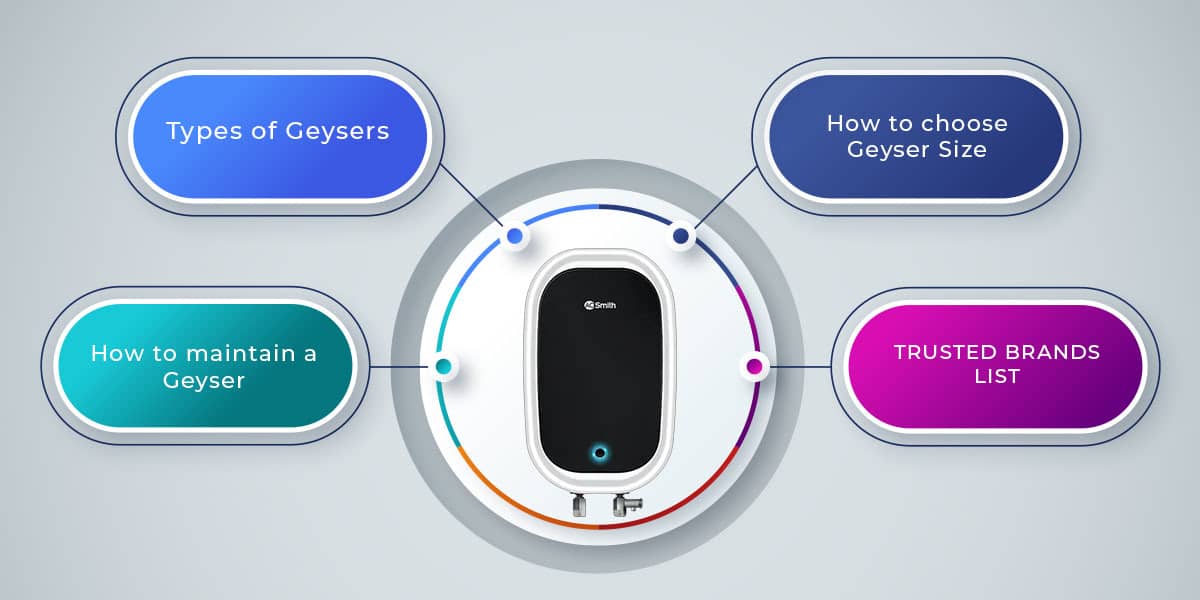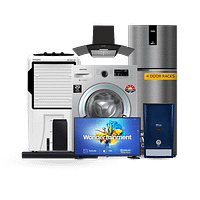
Geyser Buying Tips: Freezing winters have graced the threshold of homes, so it’s a must to have an ongoing supply of hot water. Whether for a relaxing bath or shower or just simply to wash your dishes, a geyser is a must to make the chill of winter bearable. However, there are many factors that one should consider before buying a geyser.
To know that, you simply need to stay persistent with this blog, “Geyser Buying Tips,” in which we have provided some crucial insights and what aspects to consider before purchasing this bathroom appliance. Therefore, explore with us the many reasons for buying a geyser and how it can improve the wintertime experience and make your winters more comfortable.
ALSO READ: Best Soundbar Buying Tips
What is The Process by Which Geysers Operate? : Geyser Buying Tips
Within a geyser, the heating element, the pressure release valve, and the thermostat are the three primary components of the heating tank. Now, what’s essential about these components is the way they work together to ensure the efficient and safe operation of the geyser. The heating element heats water, while the pressure release valve regulates tank pressure to prevent explosions. The thermostat controls heating element activation and temperature.
- In operation, when the water temperature drops below the desired level, the thermostat signals the heating element to activate and start heating the water.
- The water expands as it gets hotter, building pressure inside the tank. Here, the pressure relief valve comes into play by releasing excess pressure to prevent potential explosions or damage to the geyser.
This combined functioning of these components ensures both efficient heating and safety in geyser operation.
Why Having a Geyser is Essential?
- Geysers fulfill your hot water needs all year long, which you can use for various purposes, such as bathing, washing, cooking, and cleaning.
- One can spend a leisurely winter taking long, warm showers or enjoying a relaxing bath without worrying about running out of hot water.
- Geysers are reliable and energy-efficient appliances comparable to any other heating device, such as immersion rods and heating coils.
- Geysers are equipped with features like an auto cut-off, thermostat, and glass coating that prevent overheating, save power, and prevent the appliance from corrosion and scaling.
- Being a cost-effective and utility appliance, a geyser is a great way to add value to your house.
The “Many Types” of Geysers to Opt From: Let’s Explore in Depth: Geyser Buying Tips
You may have heard that geysers are energy-efficient and can help save on electricity bills, but do you know that these efficient home appliances have “many types”? With their ability to cater to one’s multitude of personalised requirements, geysers come in different types, such as instant geysers, electric geysers, gas geysers, solar geysers, storage geysers, and tankless geysers. These geysers will undoubtedly satisfy all of your needs, so let’s dive head-on into elaborately knowing them.
Storage Geyser
Another option to consider when opting for a heating system is the storage geyser, which is designed to store and heat a large quantity of water. The name ‘storage geyser‘ is quite self-explanatory, as it indicates that these geysers have a built-in tank to store hot water for future use. This makes them ideal for households with high water consumption, as this type of geyser is the perfect geyser size for family of 5, ensuring that there is always enough hot water available for everyone. Also, storage geysers are known for their insulation properties, which help in retaining heat and prevent extra energy waste.
Electric Geyser
This home appliance is the most common type of geyser that is installed in many households, making it the go-to choice for most people. It uses electricity to heat water and typically has a storage tank to store hot water for later use. They also offer precise temperature control, enabling you to adjust the water temperature as per your usage and requirements. Electric geysers are easy to install and maintain, making them a convenient option for many homeowners and the perfect geyser for family of 5.
Gas Geyser
Another option, as per our geyser buying tips, is the gas geyser. This home appliance solely runs on an LPG connection and does not require electricity. And what else is known is that gas geysers are known for their fast heating capabilities, providing hot water almost instantly. Moreover, what makes them a good buy is that they are also more energy-efficient compared to electric geysers, resulting in lower utility bills.
Geyser Buying Tips: Gas geysers require proper ventilation and regular maintenance to ensure safe operation.
Solar Geyser
People who are seeking an environmentally friendly option should consider a solar geyser. What makes them stand out on our blog of geyser buying tips is the ability to retrieve the sun’s rays to heat water, which makes them a sustainable option for everyone. On top of that, these efficient heating systems are beneficial in regions with ample sunlight, as they can significantly reduce electricity consumption and save on electricity costs.
Geyser Buying Tips: Solar geysers often come with backup systems to ensure hot water availability, even on cloudy days. Therefore, make sure you look for this backup system before buying a solar geyser.
Tankless Geysers: Geyser Buying Tips
Another heating system worth considering is tankless geysers, which are similar to instant geysers. However, tankless geysers do not store hot water in a tank like traditional geysers do. Instead, they heat the water as it passes through the unit, providing an infinite and regular supply of hot water without needing a storage tank. This makes them more energy-efficient and space-saving compared to other types of geysers.
Instant Geyser
Now, we have the Instant Geyser as an option worth purchasing, especially if you require swift hot water. Unlike traditional geysers, in instant geysers, water is heated as it passes through the device, cutting out the need for a storage tank. This not only saves space but also reduces energy consumption by only heating the water that is actually being used, making it an applicable geyser size for a family of 5.
Let’s Discuss Factors To Consider Before Buying the Geyser: Geyser Buying Tips
Choosing the right geyser can be tricky because there are many things to be mindful of. However, our “geyser buying guide” incorporates all the crucial elements to help you in the long run. So, let’s begin with the factors that one should keep in mind before buying a geyser.
Configuration of the Geyser (Shape and Size)
One major thing to consider when buying a geyser is evaluating an applicable size before choosing a heating appliance.
Geyser Size for Family of 3 to 4
If your family consists of two or four people, you will need a 6-litre geyser if you bathe while using a bucket. On the other hand, the same family will require a 10-litre to 15-litre geyser for shower baths. However, if you’re utilising it for culinary purposes, like washing dishes or other items, one litre of geyser will be plenty.
Geyser Size for Family of 5 to 8
For families of four to six people, a 25-litre storage geyser is an ideal size for all your bathing needs, particularly for showers. If you need a geyser for cleaning purposes in the kitchen, like cutlery or other utensils, a 6-litre model will suffice.
The configuration, like shape and size, plays an essential part before selecting a geyser for your home because if you utilise an immense capacity geyser, like 25 litres, for a small family, it will lead to heating extra water and eventually power wastage. That is why the size of the geyser is essential.
The Shape of the Geyser
The shape of the geyser, which typically has two forms, vertical and horizontal, is another important consideration in addition to its size. People usually don’t give the shape much thought because most Indian families prefer vertical heaters. On the other hand, Horizontal geysers are an ideal option for those with a lower-ceiling bathroom, as the wall space is minimal for a vertical geyser.
Geyser Buying Tips: The shape of the geyser can determine its installation options and how it fits into your space.
Power Output of the Geyser for Energy Efficiency
The power output, or wattage, of a geyser depends on how much time it takes to heat the water. Instant geysers require a low power of around 1,500 to 3,000 watts to quickly heat the water as it flows through the system. On the other hand, storage geysers have a higher power output ranging from 2,000 to 5,000 watts since they need to heat and maintain a larger volume of water.
Choosing the right power output for your geyser is crucial for optimising energy efficiency and ensuring sufficient hot water supply. Therefore, if energy efficiency is a priority, opting for an instant geyser might be a better choice.
Some Pointers in “Geyser Buying Tips” To Help You Lower the Energy Consumption
Mentioned below are the following actions to reduce the energy usage of geysers:
- Insulate the geyser to retain heat and prevent heat loss.
- Ensure the thermostat temperature is set at an optimal level.
- Opt for a geyser with a BEE star rating, indicating better energy efficiency.
- ISI-certified geysers also guarantee that quality and safety standards are fulfilled.
- Check water temperature input as the power wattage is higher where the climates are relatively colder.
Installation and Placement of Geysers
When installing a geyser, it is important to consider its placement. Geysers should be installed in a well-ventilated area to prevent overheating and potential damage. Additionally, they should be placed near the point of use to minimise heat loss through long pipes and reduce the time it takes for hot water to reach the desired location.
Heat-Up Time for Water
The heat-up time for water in a geyser can differ because of the size and power. Generally, geysers with higher wattage will heat up water faster. It is important to consider the heat-up time when choosing a geyser to ensure that it meets your hot water needs in a timely manner.
Water Quality Evaluation
Another important factor to consider when using a geyser is the quality of the water. Hard water with higher mineral content can lead to buildup and ultimately lower the efficiency of the geyser over time. Hence, regular maintenance and periodic descaling are important to maintain optimal performance so that the geyser will work for a longer period of time.
Geyser for Various Building Types
When choosing a geyser, it is important to consider the size and type of building it will be installed in. Different buildings have different hot water demands, so selecting a geyser that is suitable for your specific building type will ensure that you have enough hot water for your requirements.
Additionally, factors like insulation and plumbing layout should be taken into consideration for an adequate energy efficiency output and minimal heat loss.
Smart Geyser for Smart Home
With smart appliances being trendy, geysers with smart connectivity with your handy gadgets like phones or tablets are on the rise. Such geysers are convenient because of their many features. For instance, you can arrange a hot water supply or change the temperature remotely using a smartphone app, even when you’re not at home. Furthermore, some smart geysers are equipped with smart sensors that monitor your consumption habits and modify their heating cycles to conserve energy.
Warranty and Guarantee of Geyser
Another critical factor to consider when choosing a geyser is the warranty and guarantee provided by the manufacturer. It is advisable to select a geyser that comes with a comprehensive warranty and guarantee, as this will provide you with peace of mind in case any issues arise with the product.
Additionally, it is recommended that you read and understand the terms and conditions of the warranty, including any maintenance requirements or restrictions, to ensure that you can fully benefit from it.
Buy from a Trusted Brand: Gesyer Brands in India
When purchasing a geyser, opting for a trusted brand is always wise. A well-established brand’s reputation precedes itself for producing reliable and durable appliances, ensuring that you get value for your money. Additionally, trusted brands usually have a wider network of service centres and authorised technicians, making it easier to access support and repairs if needed.
<Geyser Brands in India are:
- Crompton
- Bajaj
- Morphy Richards
- Racold
- V-Guard
- AO Smith
- Hindware
- Havells
- Orient Electric
- Kenstar
- Thompson
- Venus
Maintenance of Geyser: Geyser Buying Tips
In our “Geyser buying tips” blog, another significant element is that people should pay extra attention towards the maintenance of a geyser. Thus, some of the fundamentals that will guide how to maintain a geyser in the long run are mentioned below. So, sit tight and let us give you a brief overview.
Regularly Flushing Out Sediment/ Wastewater Buildup
The regular flushing out of wastage is important as sediment buildup can affect the functioning value and may malfunction the geyser. Moreover, cleaning out these waste deposits helps prevent clogs and ensures the geyser continues operating smoothly.
Checking the Pressure Relief Valve
The thorough checking of the Pressure Release Valve is important to ensure the safety of the geyser and prevent any potential damage or accidents. The pressure release valve is built to release extra pressure, so it’s important to check if it is working correctly and replace it if necessary or damaged. The regular inspection and maintenance of the pressure release valve will help keep the geyser running efficiently so that it won’t cause any accidents.
Inspecting the Anode Rod
Another important step in maintaining a geyser is inspecting the anode rod. What the anode rod does is prevent corrosion inside the geyser tank, so make sure to watch out for any signs of damage or deterioration. Also, regularly replacing the anode rod will prolong the lifespan of the geyser and ensure it continues to function effectively.
Lower Temperature Setting
Lowering the temperature settings on the geyser can also contribute to its efficient operation. By reducing the temperature, you can minimise energy consumption and potentially extend the lifespan of the heating elements.
Insulate
Insulating the geyser tank is another effective way to maintain its efficiency. Adding insulation can help retain heat, reducing the amount of energy needed to heat the water and preventing heat loss.
Benefits of Buying an Optimal Geyser: Geyser Buying Tips
- Time is saved with an instant geyser, and convenience increases as the geyser produces hot water instantly, eliminating the need to wait for the water to warm up.
- They work better in areas with lower temperatures, with a greater need for hot water.
- In general, geysers take up less space to install than conventional water heaters, which makes them a sensible option for apartments or smaller houses.
- A geyser can save energy and money, especially if it is powered by renewable sources such as solar or gas or if it has features such as thermostats, timers, or insulation.
- A geyser can improve the quality of water, as it can kill bacteria and germs that may be present in cold water.
ALSO READ: Geyser Buying Tips 2024
Conclusion: Geyser Buying Tips
It is a universal experience when we decide to buy an appliance and not get trampled by aspects like price, quality, energy efficiency, brand reputation, functionality, and whatnot. Many doubts cloud our minds, like, if not this, then what? So, if you are unsure about what to look for before buying a heating system, don’t fret because our “Geyser buying tips” include all the key elements to guide you through.
From how many types are available in the market to how to maintain a geyser, this geyser buying tips guide will assist you in adding a geyser to your home space. Now, whenever you decide to buy a geyser, you’ll have sufficient knowledge to spend a leisurely winter. Happy Shopping!
FAQs: Geyser Size for Family of 4
There are many things to consider when preserving a geyser, such as regular maintenance, monitoring water levels, and protecting the surrounding environment.
Some of the key benefits of a geyser are faster heating time, energy efficiency, and a continuous supply of hot water.
Some of the drawbacks of geysers are higher energy consumption, the potential for leaks or malfunctions, and the initial installation cost.
Regarding safety, it is important to choose a geyser with proper safety features, such as temperature control, pressure release valves, and a sturdy build.
It is crucial to consider the number of people in the household and their hot water requirement when choosing the right geyser size for a home.
1. The geyser size for a family of 3 with a capacity of 15–25 liters would be suitable for a home.
2. The geyser size for a family of 4 with a capacity of 25–35 liters would be more appropriate for a home.
3. The geyser size for a family of 5 with a capacity of 35–50 liters would be the best option for a home.
While maintaining a geyser, make sure that you regularly check and clean the geyser’s heating elements to prevent sediment buildup, monitor the geyser’s temperature and pressure settings, and regularly inspect for any leaks or signs of damage









